How Competitor Keyword Analysis Can Improve Your SEO
As someone who’s working to grow your business, you’re used to competition. You probably know all about your competitors’ products and services. You may have also looked into their marketing strategies. But how much time have you spent analyzing the keywords they rank for in organic and paid search?
Ranking in search engines, both with organic and paid listings, is competitive. Competitor keyword analysis helps you learn more about your competitors, the strategies they use to rank in search engines, and how you can outrank them, driving more leads to your website.
Want to learn more about competitor keyword analysis? Keep reading or request a free quote to learn how we can help you analyze your competitors’ search engine optimization (SEO) and improve your search engine performance.
Are you interested in custom reporting that is specifc to your unique business needs? Powered by MarketingCloudFX, WebFX create custom reports based on what you care about most.Measuring what matters most
What is competitor keyword analysis?
Competitor keyword analysis involves evaluating your competitors’ strategies and keywords for SEO and pay-per-click (PPC) search advertising. You discover which keywords your competitors rank for, analyze the strengths and weaknesses of top-performing pages, and identifying opportunities to improve your rankings.
Why conduct a competitor keyword analysis?
Conducting a competitor keyword analysis can help you improve your SEO rankings and outperform your competitors in search.
Analyzing your competitors enables you to understand how you’re doing in comparison. You can use this information to uncover areas of your SEO strategy that you can improve.
It can also reveal new opportunities and provide inspiration for your SEO efforts, helping you stay competitive.
You might, for example, discover popular keywords that your competitors aren’t targeting. You might also find keywords that your competitors are ranking for but that you haven’t tried to target yet.
Exploring the top-ranking pages can then provide knowledge that informs your strategy for earning a top spot in the search engine results pages (SERPs). You can evaluate what the top-performing pages do and don’t do well, which tells you what you might need to do to rank higher than them.
Competitor keyword analysis also gives you an idea of which keywords are worth targeting. If your competitors bid on a particular keyword for PPC search ads and the bids are relatively high, that’s a sign that keyword is valuable to your industry.
Competitor keyword analysis tools
Keyword research tools can make the competitor keyword analysis process much easier and help you collect more detailed data. You have several choices when it comes to competitor keyword analysis tools. Here are some of the top options.
Ahrefs
Ahrefs is a popular SEO tool that provides many useful features for competitor keyword analysis. You can search competitors’ sites and get a list of the keywords they rank for, compare your keywords to your competitors’ keywords, and more.
Moz
Moz offers several tools that can help you analyze your competitors’ keywords. Its Domain SEO Analysis Tool can show you websites that target the same keywords you do, for instance. You can also use Moz’s Keyword Explorer to compare your keyword rankings to those of your competitors.
SEMrush
Another powerful competitor keyword research tool is SEMrush. It lets you see which keywords your competitors rank for, compare your keyword rankings to those of other websites, and filter your results according to various criteria. Additional features enable you to analyze competitors’ backlinks and various other aspects of their site.
SpyFu
SpyFu is a dedicated competitor research tool that can provide a substantial amount of data on your competition. With this tool, you can discover information about rankings, search volume, ad spend, and more. Using the Kombat feature, you can compare the keywords that several domains rank for.
CompetitorSpyFX
CompetitorSpyFX is a competitor comparison tool from WebFX that’s part of our digital marketing platform, MarketingCloudFX.
With CompetitorSpyFX, you can view data about your competitors’ keywords in a visual report. You can also use the projections feature to see how various changes will likely affect your rankings, helping you create a winning SEO strategy. CompetitorSpyFX also helps you analyze your competitors’ content marketing, referring domains, and more.
How to do competitor keyword analysis
There are several different strategies you can use for conducting competitor keyword research. Check out the following tips to learn how to do competitor keyword analysis.
Identify your competitors
No matter which approach you take to competitor keyword analysis, it’s essential to identify your competitors.
In some cases, the competitors you focus on in your analysis will be your direct competitors — businesses that offer the same products or services as you to the same audience.
For example, suppose you run a software as a service (SaaS) company that offers accounting software to U.S.-based small-to-mid-sized businesses (SMBs). In that case, you’ll likely want to analyze companies that provide that same product to U.S.-based SMBs.
Looking at these competitors is useful if you want to, for example, evaluate the overall search landscape in your industry or get ideas for your SEO strategy.
At other times, you might be competing for rankings with businesses or websites you wouldn’t typically consider your competitors.
For instance, for the keyword “accounting software for SMBs,” you might be competing in the SERPs with websites that publish content about technology or business, in addition to other SaaS companies.
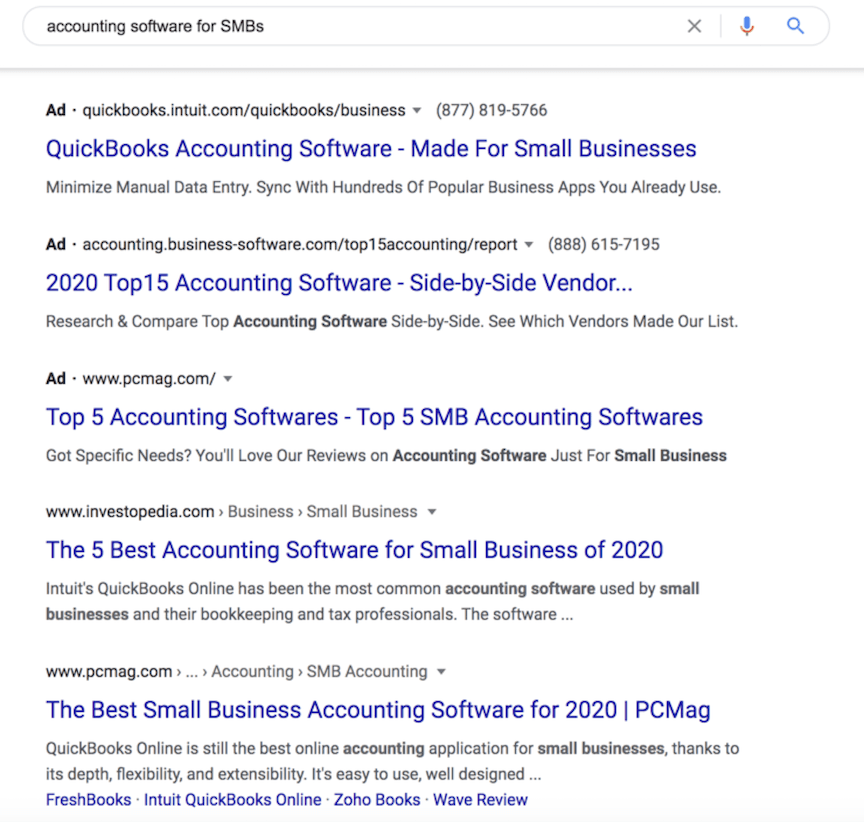
Use a keyword tool to identify the keywords for which your competitors rank
You can use various keyword tools to identify the keywords for which your competitors rank well. If you search a domain or URL in many of these tools, you’ll get a list of the top keywords for which they rank. In many of these tools, you can choose to explore either organic or paid keywords.
For example, to see a competitor’s keywords in Ahrefs, go to Site Explorer and input their domain. Then, click on ‘Organic keywords’ at the top of the page or in the left-hand sidebar for a list of the top organic keywords they rank for.
You can also click on ‘PPC’ at the top of the page or ‘PPC keywords’ on the left side for a list of your competitor’s top paid keywords.
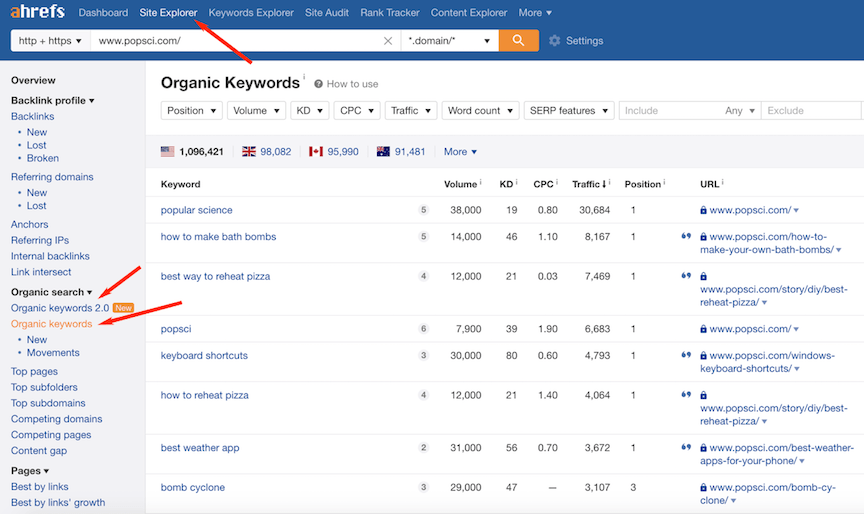
Analyze the keywords
Once you get a list of keywords, you’ll need to analyze them to determine which ones are the best ones for you to target. Some of the factors to look for include the following:
Search volume
Search volume refers to the number of users who search a given keyword, typically measured as an average amount per month. Ranking for keywords with high search volume results in more impressions and often more traffic to your website.
Keyword difficulty
Keyword difficulty, or ranking difficulty, is another important metric to consider. It tells you how competitive a keyword is and how hard it is to rank for. Keywords with higher search volume are often more challenging.
The more popular and well-established your site, the more likely you are to rank for difficult keywords. Ranking for highly competitive keywords often requires more SEO expertise and funding.
A smart strategy is to look for keywords with a relatively high search volume compared to their keyword difficulty. In most cases, relatively new websites or SMBs should focus on keywords with only moderate difficulty for the best chance of ranking. Once you rank for a large number of moderately difficult keywords, you can move on to more challenging ones.
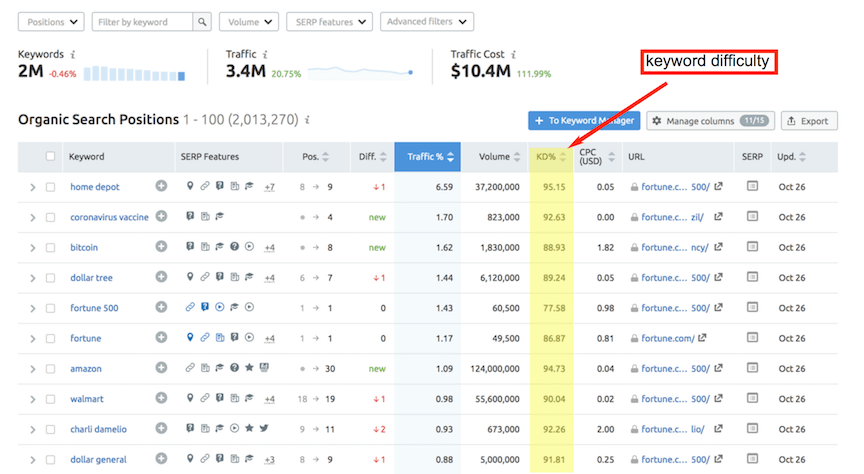
Relevance
Not every keyword that your competitors rank for or that has a high search volume will be relevant to your business.
Before investing in targeting a given keyword, think about who might search that keyword and what they likely hope to accomplish by searching it. That goal is called search intent.
If the user profile of a searcher matches your target audience and their search intent is relevant to your business, consider targeting the keyword. If not, that keyword likely isn’t the best choice for your business.
Determine which keywords competitors consider high-value
Evaluating search volume, relevance to your business, and other elements can help you identify which keywords might be worth a lot to your company. Another way to determine which keywords are high-value is to figure out which keywords your competitors view as high-value.
One way to do that is to look at the paid search results for which your competitors appear. You can use a keyword research tool to get a list of these paid keywords. You can also search keywords and look at the top of the SERP for PPC ads.
If your competitors are paying to show up in search, they value that keyword.
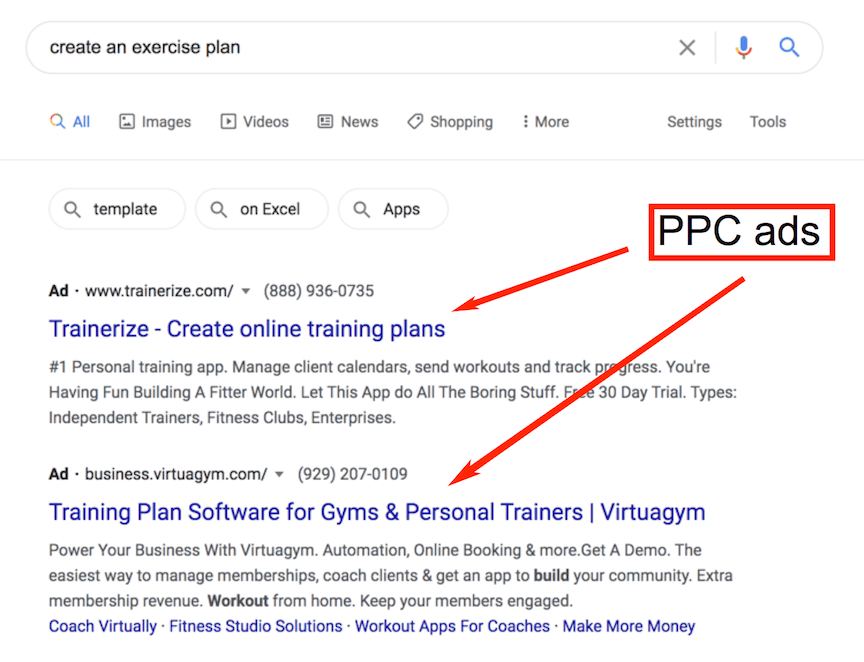
Another thing to look for is content assets like webinars, ebooks, and whitepapers. These types of content take a considerable amount of time and money to make. So, if your competitors invest in creating these kinds of content for a particular keyword or topic, they consider that term high-value.
Use a keyword tool to identify keyword gaps
Another keyword tool feature that’s useful for competitor keyword analyses is the keyword gap feature, as it’s called in SEMrush, or the content gap feature, as it’s called in Ahrefs.
These features show you keywords that your competitors are ranking for but that you’re not ranking for. To get this information, input your domain as well as those of several of your top competitors. The tool then compares your keywords and shows you any gaps in your targeting.
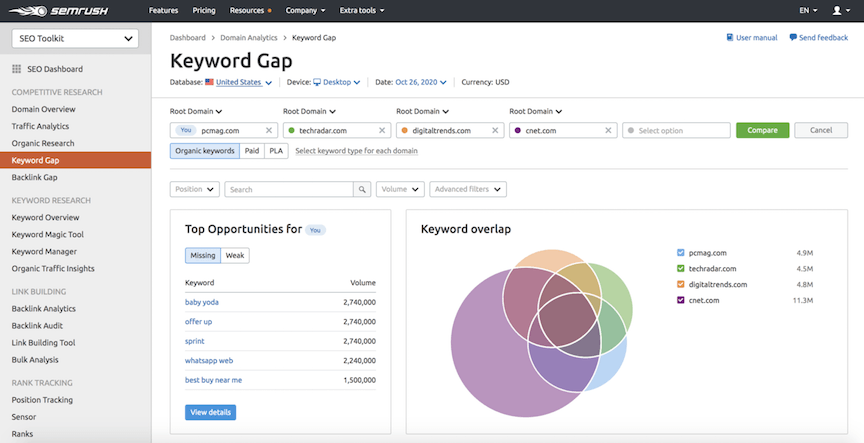
Analyze the SERPs
Once you come up with a list of keywords to target, a crucial next step is searching those keywords and analyzing the SERPs.
Look at the top-ranking pages and examine what they do well and where they’re lacking, as this can give you ideas on how to outperform them. It helps to have SEO knowledge when evaluating these pages. However, if you don’t, just evaluate them as you do when using Google.
Ask yourself questions such as:
- Does the page meet search intent?
- How quickly does the page load?
- Is the page user-friendly and easy to navigate?
- Is the page’s look and feel appealing?
- Does the page work well on mobile devices?
Outperform your competitors in search with WebFX
When it comes to creating an SEO strategy, one of the best sources of information is your competitors. Conducting a competitor keyword analysis can help you determine what you need to do to rank well in search and drive more qualified traffic to your website.
The right tools and the right partners can help you get more from your competitor keyword research and your SEO.
Our competitor research tool, CompetitorSpyFX, presents competitor data in an easy-to-digest visual format and helps you create an effective SEO strategy by providing projections of how changes will affect your rankings. CompetitorSpyFX is part of our comprehensive digital marketing platform, MarketingCloudFX.
Our team of experts can also help you develop and implement a digital marketing strategy that enables you to outperform the competition in search. Request a free quote or call us at 888-601-5359 to learn more.